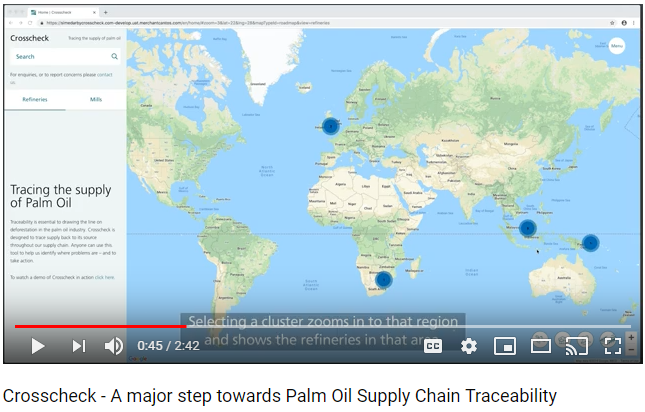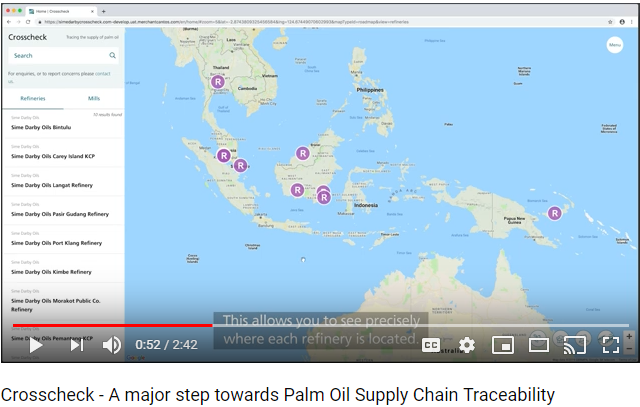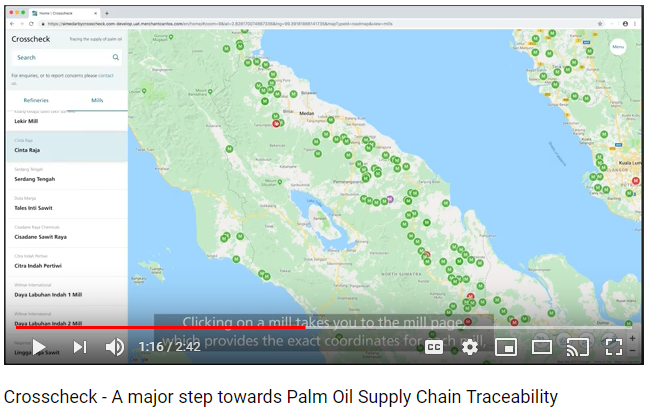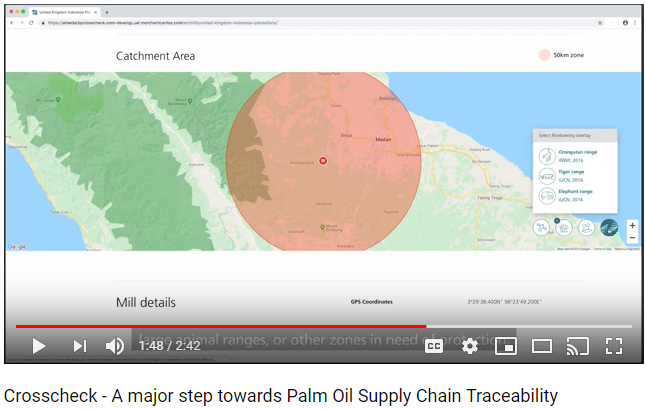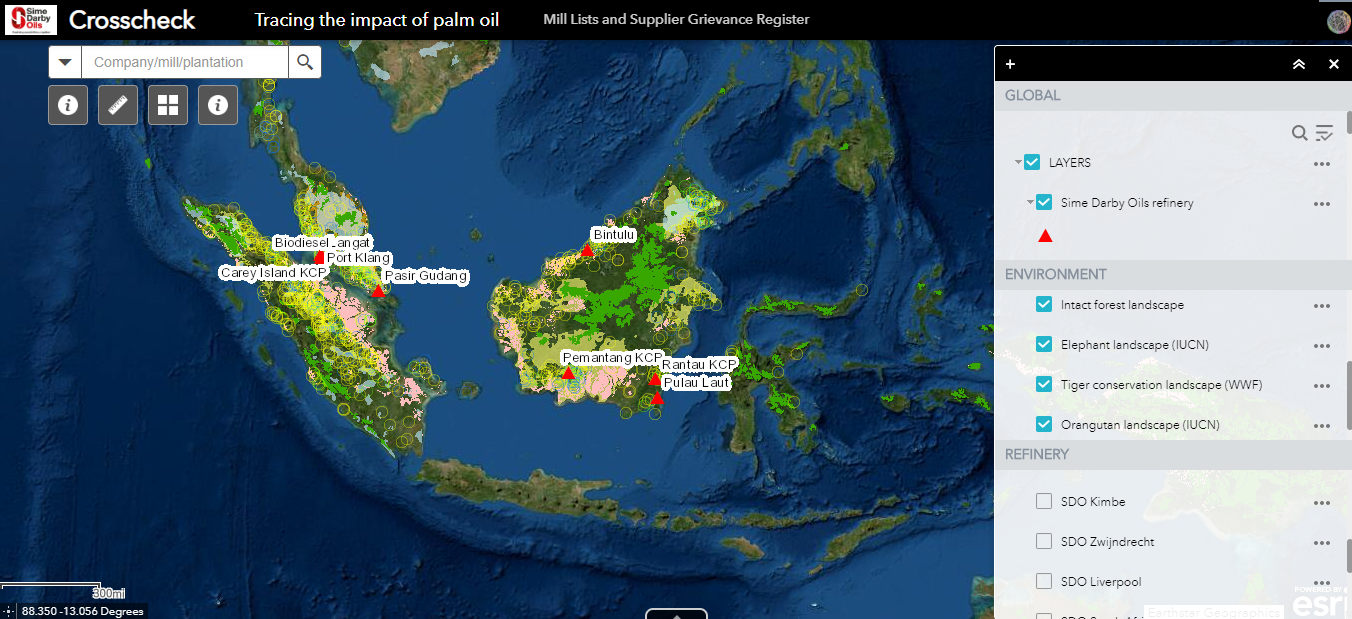Sime Darby Launches Palm Oil Traceability Tool for Consumer Confidence
The world’s biggest palm oil planter, Sime Darby, has released a new “easy tool to check the source” of their palm oil. This is a bold step undertaken by the company to bare itself for all to see.
If it works, the traceability tool will be a challenge for not just palm oil but all commodities that have become a part of our everyday lives. Even as the student strikes for climate inspired by Greta Thunberg continue to occupy the headlines, commodities including beef and soy have been identified as major drivers of deforestation at a scale which threatens the future lives of these students globally.
Why palm oil?
As one of the best performing green oils on earth, the development of the palm oil industry in the past twenty years has led to criticisms of how it causes deforestation and threatens exotic apes like the orangutans or gorillas with extinction. This has put palm oil in the sights of environmental groups which have campaigned against it intensively in the past fifteen years. Recent revelations of soy’s environmental impact has attracted scrutiny to the industry as well. According to supply chain experts, the demand for sustainable consumer products is only beginning.
Sooner or later, European grown vegetable oils in sunflower and rapeseed will come under scrutiny as environmental groups start to challenge the environmental disaster that is unfolding across Europe.
Whether orangutans will face ecological catastrophe due to palm oil the same way that insects and birds in Europe have, is a question that only time will answer. Meantime, the new traceability tool at Sime Darby throws out a challenge to producers of consumer goods from meat to packaging materials that should be answered by those industries.
Why Sime Darby?
Sime Darby, with its headquarters in Malaysia, is the world’s biggest planter of palm oil and the world’s biggest producer of Certified Sustainable Palm Oil.
With operations in eight countries, the presence of its product is almost guaranteed in supermarkets from Australia to Europe. This makes it all the more important for Sime Darby to show with clear certainty, that its palm oil is not associated with any of the accusations usually leveled at palm oil.
Just as the internet has made it easy for the average consumer to research product details, Sime Darby’s tracing tool appeals to that same conscientious consumer to do the research on its palm oil. This sponsored news report ( part of corporate transparency) lists out the ambitions of the tracing tool with quotes from key management. Statements like:
Testing the Sime Darby tool
All of this sounds great so we gave the tracing tool a test drive to see how it works.
We took on the role of that as a concerned consumer who had only recently read about palm oil’s impact on forests and decided to look into the news on the tracing tool at Sime Darby.
An online search for “Sime Darby Cross Check” showed SimeDarbyPlantations as the website to go to. This is not to be confused with the other corporate website SimeDarbyOils where the tracing tool, Cross Check, has not been mentioned yet under the Sustainability or News&Stories tabs.
The correct landing page for “Sime Darby Cross Check” is this one which includes a YouTube tutorial on how it works.
If it works, the traceability tool will be a challenge for not just palm oil but all commodities that have become a part of our everyday lives. Even as the student strikes for climate inspired by Greta Thunberg continue to occupy the headlines, commodities including beef and soy have been identified as major drivers of deforestation at a scale which threatens the future lives of these students globally.
Why palm oil?
As one of the best performing green oils on earth, the development of the palm oil industry in the past twenty years has led to criticisms of how it causes deforestation and threatens exotic apes like the orangutans or gorillas with extinction. This has put palm oil in the sights of environmental groups which have campaigned against it intensively in the past fifteen years. Recent revelations of soy’s environmental impact has attracted scrutiny to the industry as well. According to supply chain experts, the demand for sustainable consumer products is only beginning.
Sooner or later, European grown vegetable oils in sunflower and rapeseed will come under scrutiny as environmental groups start to challenge the environmental disaster that is unfolding across Europe.
Whether orangutans will face ecological catastrophe due to palm oil the same way that insects and birds in Europe have, is a question that only time will answer. Meantime, the new traceability tool at Sime Darby throws out a challenge to producers of consumer goods from meat to packaging materials that should be answered by those industries.
Why Sime Darby?
Sime Darby, with its headquarters in Malaysia, is the world’s biggest planter of palm oil and the world’s biggest producer of Certified Sustainable Palm Oil.
With operations in eight countries, the presence of its product is almost guaranteed in supermarkets from Australia to Europe. This makes it all the more important for Sime Darby to show with clear certainty, that its palm oil is not associated with any of the accusations usually leveled at palm oil.
Just as the internet has made it easy for the average consumer to research product details, Sime Darby’s tracing tool appeals to that same conscientious consumer to do the research on its palm oil. This sponsored news report ( part of corporate transparency) lists out the ambitions of the tracing tool with quotes from key management. Statements like:
Testing the Sime Darby tool
All of this sounds great so we gave the tracing tool a test drive to see how it works.
We took on the role of that as a concerned consumer who had only recently read about palm oil’s impact on forests and decided to look into the news on the tracing tool at Sime Darby.
An online search for “Sime Darby Cross Check” showed SimeDarbyPlantations as the website to go to. This is not to be confused with the other corporate website SimeDarbyOils where the tracing tool, Cross Check, has not been mentioned yet under the Sustainability or News&Stories tabs.
The correct landing page for “Sime Darby Cross Check” is this one which includes a YouTube tutorial on how it works.
It is a dynamic tool that exposes the whole Sime Darby operation from the location of its global operations
To its mills that process fresh palm oil fruits
To the suppliers of the mills
All the way down to whether any of the supply sources might have come from impacted forest areas for example, illegal palm oil plantations.
This is corporate supply chain transparency in an extreme format. With inquisitive eyes constantly poring over producers of palm oil, soy, beef and other consumer products, it is doubtful that any other supplier of commodities will go to this extreme to prove the sustainability of their product. This is especially so in the case of palm oil which is mostly used as a side ingredient.
The challenge now is for manufacturers of consumer products to up their game. In the case of the popular chocolate bar for example, it is now much easier for manufacturers to confirm the source of their palm oil from Sime Darby but do not expect that they will do so publicly. The thing is when a manufacturer decides to reveal its use of palm oil as sustainable, it tends to raise questions on the sustainability of the rest of the ingredients.
For multinationals like Nestle, the same Kit Kat brand could be using palm oil or soy lecithin. This would likely bring down demands for their soy lecithin to be as sustainable or transparent as that from Sime Darby.
It is doubtful that the average customer at Tesco or Walmart will go through the trouble to trace their palm oil or soy oil. The point being made by Sime Darby with their Cross Check tool is to open its palm oil supply chain to public scrutiny. With the striking students worldwide demanding action on climate change and the warning from IPBES of a million species becoming extinct, it is important for supply chains globally to show that they are a part of the solution.
Published May 2019. CSPO Watch
The challenge now is for manufacturers of consumer products to up their game. In the case of the popular chocolate bar for example, it is now much easier for manufacturers to confirm the source of their palm oil from Sime Darby but do not expect that they will do so publicly. The thing is when a manufacturer decides to reveal its use of palm oil as sustainable, it tends to raise questions on the sustainability of the rest of the ingredients.
For multinationals like Nestle, the same Kit Kat brand could be using palm oil or soy lecithin. This would likely bring down demands for their soy lecithin to be as sustainable or transparent as that from Sime Darby.
It is doubtful that the average customer at Tesco or Walmart will go through the trouble to trace their palm oil or soy oil. The point being made by Sime Darby with their Cross Check tool is to open its palm oil supply chain to public scrutiny. With the striking students worldwide demanding action on climate change and the warning from IPBES of a million species becoming extinct, it is important for supply chains globally to show that they are a part of the solution.
Published May 2019. CSPO Watch
UPDATE June 2020 - Since our coverage of Sime Darby's Crosscheck tool for transparency and traceability, Sime Darby Plantations has made improvements that are unparalleled in transparency. Quoting the company's statement on Crosscheck
"‘Crosscheck’ helps provide transparency by tracking supply back to its source, identifying where problems exist – and taking action that is clearly outlined in our 'Working with Suppliers to Draw the Line on Deforestation’ policy statement. (Please click here to view the statement).
The tool was designed to be developed further and after a year of collaborations with NGOs and other relevant stakeholders, the new and improved version - ‘Crosscheck 2.0’, is now available, providing further visibility on our plantations, mills, refineries and third-party suppliers.
With this upgraded version, users can view:
A map showing all the mills that supply each of SDP’s refineries and information on who owns these mills. The new version allows for users to view all the mills in our Sime Darby Oils’ (SDO) entire supply chain or each refinery’s supply chain
The updated Crosscheck 2.0 includes details on traceability to plantations, where available. At present, Sime Darby Oils' supply chain is 47% traceable to plantations.
The mills are also categorised based on our grievance register status with a summary of the cases and a link to the register that has been integrated into the map.
Crosscheck 2.0 also allows users to view SDP and SDO’s conservation projects globally."
What should be of great interest to buyers and investors is the ease of use in navigating through the mapping tool. Smart layers under the category "Environment" allows the user to select different layers for an instantaneous snapshot of where Sime Darby's operations are and their relevance to forests and wildlife.
"‘Crosscheck’ helps provide transparency by tracking supply back to its source, identifying where problems exist – and taking action that is clearly outlined in our 'Working with Suppliers to Draw the Line on Deforestation’ policy statement. (Please click here to view the statement).
The tool was designed to be developed further and after a year of collaborations with NGOs and other relevant stakeholders, the new and improved version - ‘Crosscheck 2.0’, is now available, providing further visibility on our plantations, mills, refineries and third-party suppliers.
With this upgraded version, users can view:
A map showing all the mills that supply each of SDP’s refineries and information on who owns these mills. The new version allows for users to view all the mills in our Sime Darby Oils’ (SDO) entire supply chain or each refinery’s supply chain
The updated Crosscheck 2.0 includes details on traceability to plantations, where available. At present, Sime Darby Oils' supply chain is 47% traceable to plantations.
The mills are also categorised based on our grievance register status with a summary of the cases and a link to the register that has been integrated into the map.
Crosscheck 2.0 also allows users to view SDP and SDO’s conservation projects globally."
What should be of great interest to buyers and investors is the ease of use in navigating through the mapping tool. Smart layers under the category "Environment" allows the user to select different layers for an instantaneous snapshot of where Sime Darby's operations are and their relevance to forests and wildlife.
Sime Darby's Crosscheck 2.0 can be found on this link. In making it as easy as possible for anyone to get an indepth look at their operations, no registrations or sign ins are required to access the tool. Simply click and explore.
Update December 30, 2020. Trump administration to block palm oil from second company in Malaysia over forced labor findings
The Trump administration will halt imports of palm oil from Malaysia over findings of forced labor abuses at the plantations of one of the country's top producers of the product, which is found in many everyday items.
It is the latest in a string of Customs and Border Protection restrictions aimed at stopping goods made with forced labor from entering the US market.
CBP issued a "withhold release order" Wednesday, allowing the agency to detain shipments of palm oil and palm oil products produced from Sime Darby Plantation Berhad. CNN
The Trump administration has issued a WRO on US imports of palm oil from Sime Darby Plantations. The WRO may have something to do with the allegations against Sime Darby from Hong Kong based Liberty Shared which did not share its basis for its allegations against Sime Darby.
Watch this page as we follow the developments on the US CBP action against Sime Darby.
December 30, 2020
The Trump administration will halt imports of palm oil from Malaysia over findings of forced labor abuses at the plantations of one of the country's top producers of the product, which is found in many everyday items.
It is the latest in a string of Customs and Border Protection restrictions aimed at stopping goods made with forced labor from entering the US market.
CBP issued a "withhold release order" Wednesday, allowing the agency to detain shipments of palm oil and palm oil products produced from Sime Darby Plantation Berhad. CNN
The Trump administration has issued a WRO on US imports of palm oil from Sime Darby Plantations. The WRO may have something to do with the allegations against Sime Darby from Hong Kong based Liberty Shared which did not share its basis for its allegations against Sime Darby.
Watch this page as we follow the developments on the US CBP action against Sime Darby.
December 30, 2020

